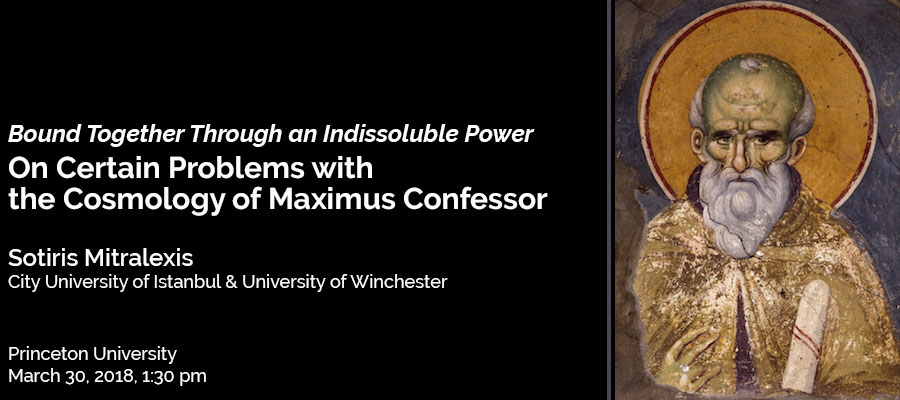Bound Together Through an Indissoluble Power: On Certain Problems with the Cosmology of Maximus Confessor, workshop with Sotiris Mitralexis (City University of Istanbul & University of Winchester), Princeton University, March 30, 2018, 1:30 pm
Respondent: Jack Tannous, Princeton University
Philosopher and Church Father Maximus the Confessor (580-662 AD) was a liminal thinker, situated on the threshold between Late Antiquity and Byzantium proper. One of the peculiarities of his use of philosophical vocabulary lies in his tendency to receive his predecessors’ conceptual toolbox and to “twist it,” thereby ascribing new meaning to it. This is not without problems: in spite of the comprehensiveness of the Confessor’s metaphysical synthesis, different passages in his works can give way to different readings, with profound implications for understanding his cosmology. This workshop shall focus on how Maximus conceives the “intelligible creation” (noēte ktisis); the Confessor seemingly provides us with contradictory passages concerning this subject, characterizing the noēte ktisis as both corruptible and imperishable. While in certain passages he states that the intelligibilia move “according to corruption,” excluding the possibility of natural incorruptibility for them, in other passages he states that the noēte ktisis possesses imperishability by nature. In examining this apparent inconsistency and in resolving it, the question of its implications for Maximus’ precise position in the intellectual and philosophical currents of Late Antique thought will be addressed.
Sotiris Mitralexis is Assistant Professor of Philosophy at the City University of Istanbul, Visiting Research Fellow at the University of Winchester, and Stanley J. Seeger Visiting Research Fellow, Hellenic Studies, Princeton University. His publications include Ever-Moving Repose: A Contemporary Reading of Maximus the Confessor's Theory of Time (2017), Μεθοδολογία καὶ Θεωρία τῆς Ἱστορίας τῆς Φιλοσοφίας (2017), and Ludwig Wittgenstein Between Analytic Philosophy and Apophaticism (2015); he has co-edited Maximus the Confessor as a European Philosopher (2017) and The Problem of Modern Greek Identity: From the Ecumene to the Nation-State (2016).
